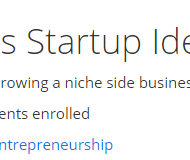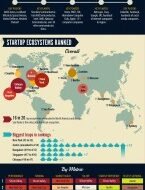Posted by Managementguru in Entrepreneurship, Financial Management, Marketing
on Oct 17th, 2016 | 0 comments

20 Main Reasons for Startup Failure Entrepreneurs start a business with the single goal of achieving success. But we also see them fail miserably. 80% of startup companies witness closure since three years of commencement says a statistics. So, what should entrepreneurs do to be in that 20% population range of successful people? One good way to start is to learn from the mistakes committed by other startup companies. Research Giant CB insights has analyzed 101 failed startup companies and found out 20 important reasons categorically. CB insights is a company that focuses on business, investment and investment strategies. Also they supply valid information on startups and their founders, venture capital and Angel investment. These are the 20 main reasons for startup failures: No Market Need – 42% Ran Out Of Cash – 29% Not the Right Team – 23% Get Out-competed – 19% Pricing/Cost Issues – 18% Poor Product – 17% Need/Lack Business Model – 17% Poor Marketing – 14% Ignore Customers – 14% Product Mis-Timed – 13% Loose Focus – 13% Disharmony on Team/Investors – 13% Pivot Gone Bad – 10% Lack Passion – 9% Bad Location – 9% Not Financing/Investor Interest – 8% Legal Challenges – 8% Don’t Use Network/Advisors – 8% Burn Out – 8% Failure to Pivot – 7% SIDBI, a government based financial organization caters to the financial requirements of small and medium enterprises. It plays a crucial role in the growth of SME’s. Startup India and Standup India are the two movements initiated by the central government to enhance the spirit of entrepreneurs. Now, SIDBI has also started SIDBI Startup Mitra to associate startup companies with incubators and investors. It is quite difficult for the startup companies to get guidance and funding. These two factors are very vital for the growth of a startup firm. Various investment agencies, angel investors and incubators have associated themselves with Startup Mitra which in turn facilitate the tie-up. SIDBI startup Mitra also paves way for startup firms to reap the benefits of government plans. The CB Insights tech market intelligence platform analyzes millions of data points on venture capital, startups, patents, partnerships and news media. Info Source: @businessfather India’s top 10 funded startups of 2016 Ibibo Group : $ 250M Investors : Naspers Industry : Online Travel Company Snapdeal : $ 200M Investors : Ontario Teachers Pension Plan, Iron Pillar, Brother Fortune Apparel Industry : online marketplace BigBasket : $ 150M Investors : Abraaj Group, Sands Capital Management, IFC, Helion VC, BVP, Ascent Capital Industry : Online Grocery Shopping and Online Supermarket CarTrade : $ 145M Investors : Temasek, Warburg Pincus, Marche Capital Industry : online auto classifieds platform Byju’s Classes : $ 75M Investors : Sequoia, Sofina Industry Byju’s mobile app has video lessons for IAS, CAT, GMAT, GRE, IIT-JEE & Class 6-12 and comprehensive study material Lenskart : $ 60M Investors : IFC, Ratan Tata, Kris Gopalakrisnan, IDG, Adveq Management, TPG Growth. Industry : Shop online for Sunglasses, Eyeglasses and Contact Lenses for men & women Mobikwik : $ 50M Investors : GMO Payment Gateway, MediaTek, Sequoi, Tree Line Asia Industry : Online Recharge, Mobile Recharge & Bill Payments Lendingkart : $ 32M Investors : Bertelsmann India, Saama Capital, India Quotient, Darrin Capital, Mayfield India Industry : SME-lending firm, Short-term loans for Small Businesses Nestaway : $ 30M Investors : Tiger Global, IDG Ventures Industry : Marketplace for shared home, apartments, flats rentals Droom : $ 29.8M Investors : Lightbox, Beenext, Beenos, Digital Garage (Japan) Industry : online marketplace to buy & sell used cars, bikes, scooters, bicycles, aero...

Posted by Managementguru in How To, Startups
on Oct 23rd, 2015 | 0 comments

Source: ComputerScienceZone.org I was referred this great infographic on #Startup Evolution by Alex Thompson that categorically explains how the #startup ecosystem has evolved world over and also about the prevailing trends in the most lucrative industry. Happy to note that Bangalore has had a giant leap forward from the 19th to 15th place in the overall ranking. Don’t miss the interesting information presented down under on the rankings of #startups and #silicon valley case study. Enjoy the Infographic… The Startup Genome Project 2.0 The most comprehensive report on #startup structure, ecosystems, and disruptive industry trends has released a second version for 2015. Here are some of the most compelling facts about startups today. Business challenges The Industrial Era: The 20th century saw the first massive shift in corporate structure. Trying to deal with problems such as: Managing an enterprise over vast geographic distances Building and managing multiple customer segments Building brands to engage the newly emerging U.S. Middle Class The Information Era: 21st century businesses are dealing with an inversion of these issues,including: Instant connectivity between customers and business Plummeting cost of entry for new ventures Global competition Re-imagining new and traditional markets as part of a connected world The new business lessons learned by startups are expected to lead the massive restructuring of all traditional corporate structures by the middle of the 21st century. So What Is a Startup? Traditional small businesses have around 75% success rates over their first two years. Startups–even with VC backing–have a 75% chance of failing. What it takes to make them work: 1.)A-Players: Have the vision, execution, risk-taking profile, listening skills, leadership, and fear of failure to create things no one else has before, often with very little direction. 2.)Close proximity: Early stage startups can change course multiple times a day, with core team members working late into the night. Workspaces are often not even separated so everyone can stay on the same quickly changing page. 3.)Feedback loops: With limited money (time) and exposure in their hands, entrepreneurs need access to customer feedback. Mentors often help with strategizing, marketing, financing, taxes, legalities, and pacing. Entrepreneurs with mentors saw 3.5 times more growth and 7 times more investment than those without mentors. 4.)An ecosystem with built in experience: Certain geographic regions have had decades of drastically higher startup concentrations. Simple Turtle – A Place Where Learning is Simple Silicon Valley Case Study: 1950’s-1978: Defense era Key players: NASA Ames, Lockheed Missile & Space Division, United Defense, Hewlett Packard 1979-1986: Integrated Circuits era Key players: Shockley Semiconductor, Fairchild Semiconductor, Intel, AMD, National Semiconductor, over 50 other semiconductor firms. 1987-1996: Personal Computer Era Key players: Xerox, PARC, SRI, Homebrew Computer Club, Apple, 15+ computer companies 1997-2005: Internet Era Key Players: Netscape, Cisco, Google, SRI, hundreds of internet companies in region. 2006-2013: Social Media Era Key players: LinkedIn, Facebook, hundreds of social media companies. Startup Ecosystems Ranked: 1. Silicon Valley 2. New York 3. Los Angeles 4. Boston 5. Tel Aviv 6. London 7. Chicago 8. Seattle 9. Berlin 10. Singapore 11. Paris 12. Sao Paulo 13. Moscow 14. Austin 15. Bangalore 16. Sydney 17. Toronto 18. Vancouver 19. Amsterdam 20. Montreal Biggest leaps in rankings include New York (5-2), Austin (unranked to 14), Bangalore (19-15), Singapore (17-10), Chicago (10-7) By Metric: Performance Top 10 1. Silicon Valley 2. New York City 3. Boston 4. Los Angeles 5. London 6. Tel Aviv 7. Berlin 8. Chicago 9. Sao Paulo 10. Bangelore Though other ecosystems are expanding rapidly, Silicon Valley still currently has as much capital and exit volume as the other top 20 ecosystems combined. Funding top 10 1. Silicon Valley 2. New York City 3. Boston 4....




